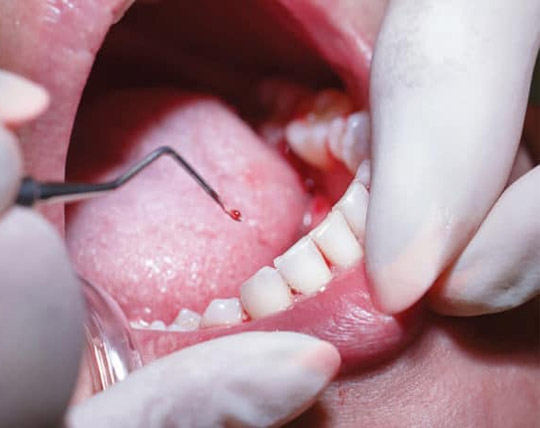Periodontology
Periodontology is the field of dentistry that is devoted to the gums. Periodontitis is an advanced form of gum disease, which affects up to 15% of the adult population in the UK. At AVC multispeciality dental care we provide expert care for patients with gum disease.What exactly is gum disease?
Gum disease is a type of oral disease, which affects the gums, the soft tissue that surrounds and supports the teeth. There are various types of gum disease including gingivitis and periodontitis or periodontal disease.Gingivitis is a mild form of gum disease, which is caused by the presence of harmful bacteria in your mouth. Bacteria combine with saliva and food debris to form plaque, a sticky substance that clings to the gum line. The bacteria in plaque release acids, which irritate the gums and cause pain and inflammation. In many cases, gingivitis can be treated and managed effectively with good oral hygiene. However, if gingivitis is left untreated, it can develop into periodontal disease.
Periodontal disease is an advanced form of gum disease, which can cause irreparable damage to the bone structures that hold the teeth in place. Bone loss causes the teeth to become loose in their sockets, causing them to fall out.
Signs and symptoms of gum disease
If you have any of these symptoms, or you’ve noticed any of these signs, we strongly recommend getting in touch and organising a consultation:- Swollen sore gums
- Increased redness in the gums
- Bleeding when you brush
- Receding gums
- An unpleasant taste in your mouth
- Tenderness in the gums
The next step will be to consider treatment options.
How is periodontal disease treated?
Treatment for advanced gum disease often comprises a combination of techniques. We will provide tailored oral hygiene advice, and we may also recommend treatments including root planing. Scale and polish treatments may be sufficient to tackle very mild cases of gum disease, but with more severe symptoms, a more intensive approach is required. Root planing involves targeting the areas of the teeth that you cannot reach with a toothbrush, and it cleans periodontal pockets and removes plaque from the tooth roots. After root planing, the size of the pockets will decrease, which will help to prevent further bone loss.Surgical Therapy
Surgical treatment may be needed in more severe cases of periodontal disease that do not respond adequately to non-surgical initial therapy. Periodontal surgical treatment today encompasses a variety of sophisticated plastic surgical procedures. These include techniques to repair and regenerate soft (gingival) and hard (bony) tissues and replace missing teeth with dental implants. They are usually performed by a periodontal specialist trained in these techniques. Most procedures are performed with local anesthesia (numbing of the gum/periodontal tissues), and sometimes with the use of intravenous or conscious sedation. The objective of surgery is generally to eliminate pockets, regenerate attachment and return the patient to more normal function and esthetics, while generally providing an environment more conducive to oral hygiene and maintenance care.

